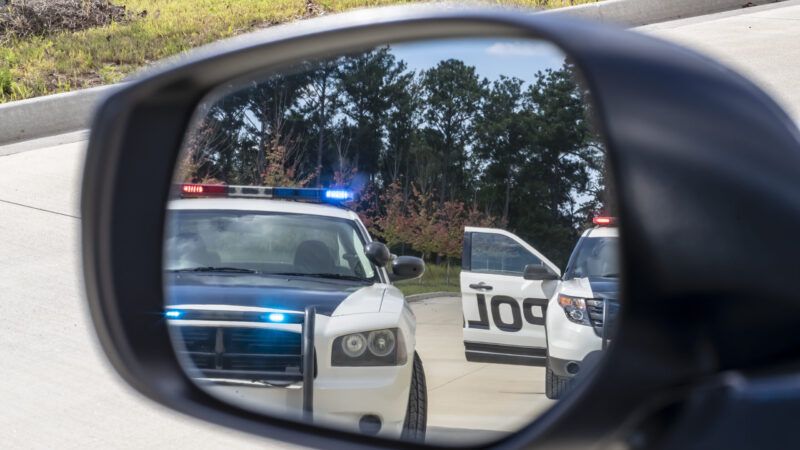South Carolina County Ends Its Civil Forfeiture Blitz After 20 Years
It’s time for the rest of the state to stop illegal searches and seizures that enrich police departments.

Out-of-state drivers have one less thing to worry about when passing through Spartanburg County, South Carolina: For the first time in nearly 20 years, they can travel without fear of Operation Rolling Thunder, an annual law enforcement blitz along Interstate 85.
Former Sheriff Chuck Wright initiated the multiday crackdowns in 2006 and expanded them over the years to involve 11 law enforcement agencies. But the run is over. Wright resigned on May 23, 2025, amid a federal criminal investigation, and interim Sheriff Jeffery Stephens announced during his first news conference that the tradition will not continue.
This is good news. Operation Rolling Thunder was an unconstitutional search-and-seizure machine that subjected thousands of innocent people to pretextual, warrantless searches. Public records show that officers routinely pulled over vehicles on the flimsiest of excuses and then manufactured probable cause to check under seats, open trunks, and unzip suitcases.
During one encounter that led to a federal complaint, officers stopped a charter bus from Shaw University in Raleigh, North Carolina, and treated every student on board like a criminal. Yet when the police rummaged through the luggage bay, they found nothing illegal—just travel supplies and a box of donuts.
Our public-interest law firm, the Institute for Justice, fought for 21 months and eventually sued for access to Operation Rolling Thunder records from 2022, the year of the Shaw incident. When we finally prevailed, we found that over 72 percent of vehicle searches produced nothing illegal.
Participating agencies cashed in anyway. When they discovered money, they assumed it was dirty and took it via civil forfeiture, a law enforcement maneuver that allows the government to seize and permanently keep property without an arrest or conviction.
Once the process ends, South Carolina allows participating agencies to split up to 95 percent of the proceeds among themselves. The result is a perverse incentive to patrol as aggressively as possible. The more vehicles an agency stops, the more it can search. The more it searches, the more it can seize. And the more it seizes, the more it can keep for off-budget expenses.
Nobody knows exactly where the money goes in South Carolina due to weak accounting and reporting laws. But Wright claimed to have spent forfeiture funds on equipment, training, and overtime pay. He told one reporter in 2019 that he liked to keep as much of the revenue in-house as possible.
"I'm a pretty self-contained fella here," he said.
Wright was also a self-promotional fella. He concluded Operation Rolling Thunder every year with a news conference that allowed him to control the narrative. Posing in front of a table loaded with seized contraband, he talked about the war on drugs and the need for tough enforcement. He never mentioned all the innocent people forced to exit their vehicles and watch as deputies snooped through their stuff.
Anyone who uses I-85 should commend Stephens for canceling Operation Rolling Thunder—it needed to go, along with its military-style branding and photo ops. Yet the underlying problem remains: Civil forfeiture invites abuse and will continue as a police funding source across South Carolina.
State and local agencies pulled in over $200 million in forfeiture revenue during the 20 years from 2000 to 2019. Imagine the effect this kind of money can have on police priorities. Most law enforcement activities drain resources. But civil forfeiture is a moneymaker.
Police often respond by patrolling for profit instead of for criminals, even when not participating in special campaigns like Operation Rolling Thunder. Civil forfeiture is a year-round pursuit. Along the way, agencies trample on the Fourth Amendment, which prohibits unreasonable searches and seizures.
Many people who lose property are innocent. Others are guilty. But even criminals have due process rights. Civil forfeiture undermines the Constitution by presuming guilt.
If property owners do nothing, they lose by default. If they fight back, they must pay attorneys' fees that are usually more than the seized items are worth. Understandably, most property owners cut their losses and walk away. Guilt or innocence is irrelevant.
Crime should not pay, and fortunately, the government has alternative methods to seize and retain ill-gotten gains without violating the Constitution. The Institute for Justice has model legislation that would ensure any seizure of assets is constitutional. Stephens has taken a step in the right direction to restore public trust in Spartanburg County. State lawmakers must do the rest.
South Carolina highways belong to the people, not law enforcement agencies looking for a payday.


Show Comments (54)